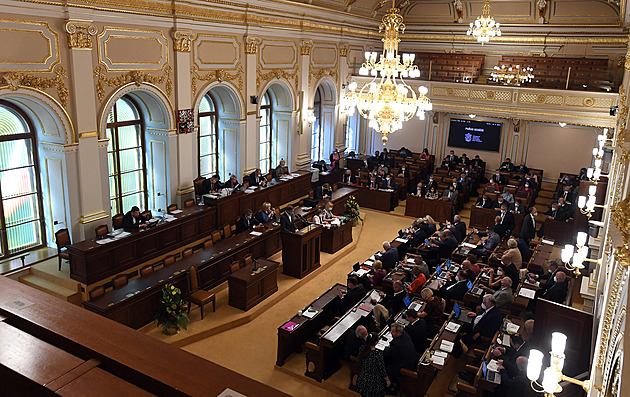The Knesset reopens for its summer session on Sunday, ending a four-week recess that did little to calm national tensions surrounding the contentious efforts by Prime Minister Benjamin Netanyahu’s government to increase its own power by sapping the judiciary of its authority and independence.
While the judicial crisis will continue to drive national politics, the Knesset’s legislative attention will shift over the next month from overhauling the courts to a more immediately pressing matter: passing a state budget.
The government will have four weeks to clear the complicated, two-year, trillion-shekel budget through the committee process and two more votes on the Knesset floor before its May 29 deadline, or risk triggering an automatic dissolution of parliament and snap elections.
But the overhaul process is expected to loom large over budgetary talks, as ministers and parties are likely to tie their interests in the judicial revamp to the process. The debate will also remain alive in negotiations at the President’s Residence and on the streets.
Finalizing the budget
The 2023 state budget is currently overdue, with Netanyahu’s government having received an automatic extension until the end of May to pass the critical fiscal plan. The deadline is exactly six months after the hard-right coalition took office.
Get The Times of Israel’s Daily Editionby email and never miss our top stories
By signing up, you agree to the terms
Netanyahu’s Likud party made generous promises to secure the support of its ultra-Orthodox and far-right coalition partners, including ample funding for Haredi education and religious initiatives, and for improving conditions for West Bank settlers.
Prime Minister Benjamin Netanyahu shakes hands with Justice Minister Yariv Levin, as other coalition members look on, after a vote on the government’s judicial overhaul plans in the Knesset early on February 21, 2023. (Yonatan Sindel/Flash90)
Finance Minister Bezalel Smotrich took heed of these promises, swelling the two-year budget to a trillion shekels. The NIS 32 billion ($8.8 billion) increase in spending from 2022 to 2023 will widen the fiscal deficit, especially in light of an expected lower tax base, tied in part to economic damage linked to the judicial overhaul.
Despite all five of the major coalition parties campaigning on reducing the cost of living, the proposed budget has been criticized for failing to meaningfully address the high prices paid by citizens for housing, goods, food, and services.
Likud MK David Bitan, chairman of the Knesset’s Economic Affairs Committee, echoed these points on Saturday night, scolding his fellow coalition lawmakers for not making substantial strides toward reducing costs or touching upon their root causes.
Status of judicial overhaul
In late March, the national drama reached a crescendo as Netanyahu, facing growing protests, strikes and general societal chaos, hit the brakes on his government’s bill to give itself control over almost all judicial appointments, mere hours before it was expected to pass into law and just before the Knesset went into recess.
Since then the country’s politics, public discourse and several national holidays have continued to be colored by the ongoing fight over the boundaries and independence of judicial power.
While coalition and various opposition teams have been engaged in talks facilitated by President Isaac Herzog, no tangible progress has been made to date, according to sources familiar with the matter. But where the shakeup was previously a tug-of-war between the coalition and opposition within Knesset halls, new fractures have emerged within the coalition itself on the path forward.
Thousands of Israelis protest against the planned judicial overhaul in Tel Aviv, on April 29, 2023. (Avshalom Sassoni/Flash90)
Hardliners within the coalition, including reform architects Justice Minister Yariv Levin and MK Simcha Rothman, are pushing for the continued advance of the package of legislation radically constraining the judiciary’s capacity to act as a brake on the political echelon, although with varying degrees of modification. Netanyahu, however, has yet to declare how he wants to proceed.
On Thursday, a mass right-wing protest heavily featuring national religious and settler supporters of the overhaul was interpreted by many as a call to Netanyahu himself to push the policies.
However, Levin acknowledged at the same rally that some compromises could be made – a conciliation that drew vocal displeasure from the estimated 200,000 in attendance.
MK Bitan, who is estranged from Netanyahu and not involved in talks at the President’s Residence, also charged on Saturday that Likud has not taken the compromise talks sufficiently seriously and urged that it do so.
Right-wing Israelis attend a rally in support of the government, outside the Knesset in Jerusalem, on April 27, 2023. (Arie Leib Abrams/Flash90)
Trouble on the horizon?
Coalition sources expect that negotiations on the overhaul may also spill over into budget talks, as politicians can couple their willingness to support one issue with another. The status of the shakeup will also affect negotiations over other bills on the Knesset’s docket.
One such proposed bill will grant sweeping military exemptions to members of the ultra-Orthodox community. The coalition’s Haredi parties are pressing to pass new exemption legislation before giving their votes to the budget, in line with the coalition agreements they signed with Likud.
Netanyahu is said to be trying to decouple the issue and push off any new bill on the draft until after the budget passes, as his office works directly with the ultra-Orthodox parties on the contentious matter.
However, earlier in April, Netanyahu evaluated a potential solution to lower the blanket military exemption age from the current 26 to between 21 and 23 for ultra-Orthodox Israelis, to let community members transition earlier from full-time religious study into the workforce without losing their shield against being drafted.
Ultra-Orthodox lawmakers are also said to be pushing for the new bill to transfer the power to the government, instead of the Knesset, to set the number of religious scholars per institution required to enlist.
File: Hundreds of ultra-Orthodox Jewish men clash with Israeli police during a protest in Jerusalem on April 10, 2014, following the arrest of a Haredi draft-dodger and against legislation intended to enforce ultra-Orthodox enlistment to the IDF. (Yonatan Sindel/Flash90)
Granting service exemptions to religious scholars has long been a hot-button issue in Israeli politics, and is part of the fissure between the opposition’s right-wing Yisrael Beytenu and its ideological bedfellows in Netanyahu’s coalition. The High Court of Justice has twice struck down broad religious study exemptions, and the Knesset has failed to draft sufficient legislation to both skirt anti-discrimination laws and satisfy ultra-Orthodox politicians.
Instead, defense ministers have been requesting and receiving extensions from the court. The current, 15th extension is scheduled to expire on July 31, 2023.
The unresolved enlistment issue is central to ultra-Orthodox parties’ push to secure a mechanism to override court review as part of the overhaul legislation: In addition to seeking control over judicial appointments, the coalition has pressed to allow the Knesset to veto Supreme Court strike-downs of legislation, as well as to defang the power of ministerial legal advisers and make a range of laws or government decisions non-justiciable, among other provisions.
When taken together, critics say that because neutering the judiciary removes the main check on political power, the changes destroy liberal Israeli democracy. Supporters say it’s a corrective rebalance of power away from an activist judiciary and toward elected representatives.
Minister of Defense Yoav Gallant (left) and MK Yuli Edelstein arrive for a meeting of the Defense and Foreign Affairs Committee, in the Knesset on March 27, 2023. (Yonatan Sindel/Flash90 )
Immediate concerns
Parallel to the restart of legislative business on Sunday, Netanyahu’s weekly cabinet meeting is expected to vote on a controversial proposal to make Zionism a guiding value in government decisions. These decisions can affect allocations of resources and functionally legalize differential treatment of populations, projects, and communities.
Negev, Galilee and National Resilience Minister Yitzhak Wasserlauf, who introduced the government decision, said on Wednesday that it would allow the government “to give preference to IDF soldiers and veterans of the army, strengthen the Jewish nation’s bond to its land and strengthen the Negev, Galilee and Judea and Samaria [West Bank].”
Functionally, the decision — if passed — would be the government’s first attempt to convert 2018’s controversial nation-state law — which preferenced Israel as the nation-state of the Jewish people — into policy.
On Monday, the Knesset will open its first legislative floor session of the summer seating. US Speaker of the House of Representatives Kevin McCarthy has been invited to address the plenummarking the second time that a US speaker of the House has addressed the Israeli parliament, following Newt Gingrich in 1998.
Note: This article have been indexed to our site. We do not claim legitimacy, ownership or copyright of any of the content above. To see the article at original source Click Here













_252863_296379_type10.jpg)



